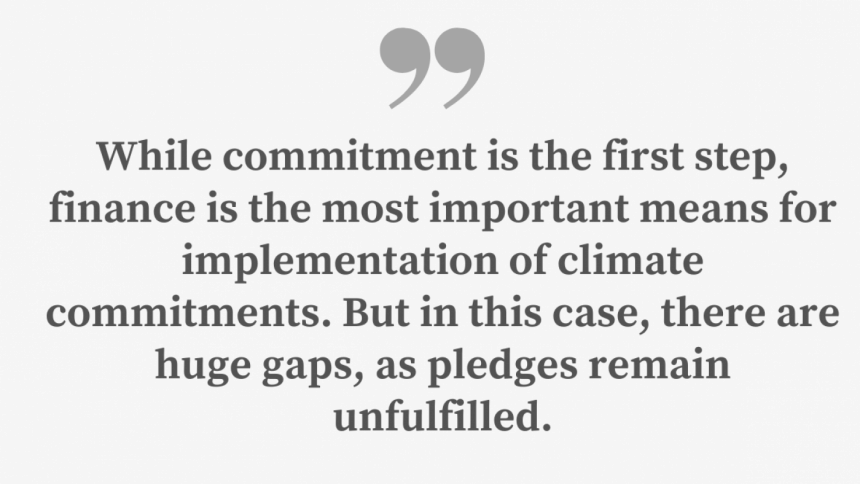Originally posted in The Daily Star on 24 January 2023
 To deliver on the climate commitments made by global leaders at the historic COP21 and COP26 of the United Nations Framework Convention on Climate Change (UNFCCC), several institutions will have to be reformed and improved to benefit the Global South, where people are facing economic, social and environmental challenges, and are most vulnerable to impacts of climate change. One of the reasons for international environmental and climate governance not delivering on the aspirations of the world is that they are very complex, and not only includes several organisations, but also agreements and treaties, policies and measures, rules, procedures, financing frameworks, and technology mechanisms. Environmental governance also connects with other areas of global governance, such as international trade.
To deliver on the climate commitments made by global leaders at the historic COP21 and COP26 of the United Nations Framework Convention on Climate Change (UNFCCC), several institutions will have to be reformed and improved to benefit the Global South, where people are facing economic, social and environmental challenges, and are most vulnerable to impacts of climate change. One of the reasons for international environmental and climate governance not delivering on the aspirations of the world is that they are very complex, and not only includes several organisations, but also agreements and treaties, policies and measures, rules, procedures, financing frameworks, and technology mechanisms. Environmental governance also connects with other areas of global governance, such as international trade.
Unfortunately, despite all these initiatives, environmental degradation continues. Deforestation, desertification, air and water pollution, and biodiversity loss are increasing, with the most dangerous threat being that of climate change.
 One of the key global governance mechanisms for addressing this is the UNFCCC, which provides the framework for international action for the Paris Climate Agreement 2015. In line with the Paris Agreement to limit global warming to well below 2 degrees Celsius, commitments of greenhouse gas emissions were made at COP26 in December 2021. More than 150 countries have set deadlines for achieving net zero emissions by the middle of the century, and submitted their plans on how to do so and by how much with their target periods.
One of the key global governance mechanisms for addressing this is the UNFCCC, which provides the framework for international action for the Paris Climate Agreement 2015. In line with the Paris Agreement to limit global warming to well below 2 degrees Celsius, commitments of greenhouse gas emissions were made at COP26 in December 2021. More than 150 countries have set deadlines for achieving net zero emissions by the middle of the century, and submitted their plans on how to do so and by how much with their target periods.
However, it did not take even a year after COP26 for some advanced countries to move away from their climate pledges. In the wake of the Russia-Ukraine war, even the champions of net zero have moved backwards and resorted to coal for energy. This gives an ominous signal to the world. Such retreat from climate commitments is not going to fulfil the global ambition for net zero by 2050. Indeed, the Glasgow targets were not enough to meet ambitions for emission reductions. According to UN emissions gap estimates, despite these commitments, the world will see a 2.5 degrees Celsius temperature rise by the end of the century. Hence, enhanced commitments are needed, which must be stronger than what was set at COP26.

There are other examples of how global governance for the environment is not functioning well. While commitment is the first step, finance is the most important means for implementation of climate commitments. But in this case, there are huge gaps, as pledges remain unfulfilled.
In 2009, at COP15, developed countries committed to USD 100 billion per year by 2020 for vulnerable climate-affected countries, which was later extended till 2025. However, till 2020, about USD 83 billion has been mobilised. Moreover, the distribution of funds is biased towards mitigation activities, which comprise 58 percent of total climate funds. But the Global South needs more adaptation funds to cope with environmental challenges to lives and livelihoods. Climate vulnerable, small island, least developed and developing countries need funds for early warning systems of natural disasters, floods and cyclones, as well as funds for food security.
There is also demand for separate financing facilities exclusively for loss and damage in climate vulnerable countries. For a long time, developed countries refused to recognise even the concept of loss and damage, which is the compensation to be paid by them for historical actions towards causing climate change. Recently, there has been a recognition of this responsibility by some developed countries, and a few also made commitments at COP27 to pay for loss and damage.
There is also a commitment by developed countries to support climate action in LDCs and developing countries through technology transfer under the trade-related intellectual property rights (TRIPS) agreement. But one observes slow progress in this case, too.
Several global organisations are part of climate governance, as they have linkages with environmental and climate issues. The World Trade Organisation (WTO) is one example. International trade has impacts on climate change, and vice versa. Countries can also address climate challenges through trade cooperation and trade policy measures. However, due to the slow progress of WTO negotiations, countries are not able to benefit from climate supportive trade measures.
Given that there are already so many institutions that deal with environmental and climate issues, there is no need for new ones. Rather, the existing ones should be strengthened and made more effective and functional. Countries in the Global South can work together to make this happen. There is a need for a thorough assessment of measures for each organisation to avoid and resolve any conflicting measures between multiple organisations. Therefore, a major task of the Global South is to ensure more transparency, comparability, compatibility, and harmonisation of environmental and climate measures. This will facilitate smooth implementation of climate promises.
Dr Fahmida Khatun is executive director at the Centre for Policy Dialogue. Views are personal.


